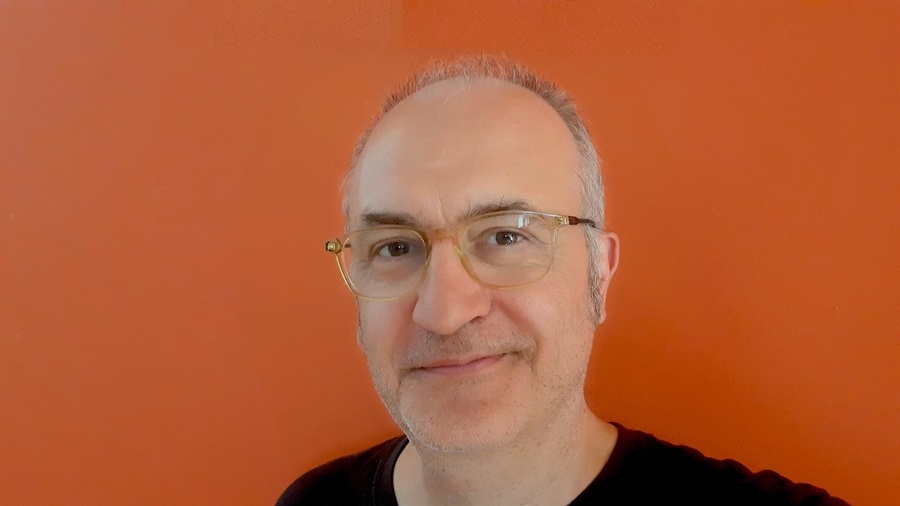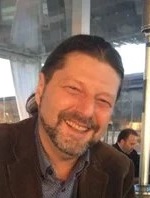- Face to face
- 30 de May de 2024
- No Comment
- 7 minutes read
E. Biosca: “I am doing something revolutionary today: defending the human species”

FACE TO FACE WITH…
The actor Eduard Biosca; “Mr. Bohigas” in the radio programme Versió RAC1
E. Biosca: “I am doing something revolutionary today: defending the human species”
I am engaged in one of the most untameable, transgressive, uncontrollable, and “uneducable” jobs that exist: humour


We meet in a bar near the Sagrada Familia just a couple of hours before his appearance on the radio programme Versió RAC1. We quickly dive into an open and sincere conversation about theatre, science, and, of course, education. This actor and comedian, born in 1965, transforms into a giant conversationalist and an exceptional scriptwriter for the talk show. Throughout his life, he has engaged in debates with realists who ground their arguments in facts, while avoiding ideologues who deny realities that contradict them. Eduard, with his characteristic irony, tells me that he has always been right, or if not, he will be. Like all good comedians, he is sharp-minded, his interest in information is global, and his capacity for synthesis is evident in his character on RAC1, ‘Señor Bohigues’, a waiter reminiscent of Santiago Segura’s Torrente and the rural logic of the countryside. An example of this is his theatrical monologues directed by Paco Mir of El Tricicle. One of many is “Cómo acabar con los pesimistas” (“How to End Pessimists”). Currently, he can be seen at the Goya Theatre in Barcelona with La Eminencia Humana.

Eduard, can you detail your latest professional project?
La Eminencia Humana is a humour monologue starring ‘Señor Bohigues’, where amidst laughter, I do something revolutionary today: defend the human species. Since October 2022, I have been performing once a month at the Goya Theatre in Barcelona. You can find me there (www.teatregoya.cat www.bohigues.cat).
What positive relationships can you establish between your professional projects and the educational training you received?
In primary school, I studied at La Roda de Terrassa school, which was very advanced for its time. It was the early 70s, and everything was already in Catalan. Additionally, we had subjects in plastic arts and body expression.
“The school schedule is adapted to parents and adult society, but not to the needs of the students”
What about the negative aspects?
What affected me the most were the schedules. I always started all subjects with great interest, but I couldn’t maintain attention for so many hours in a row. But this wasn’t a problem of my school alone; it’s an issue in all institutions. The school schedule is adapted to parents and adult society, but not to the needs of the students. Teenagers are woken up very early, and it’s proven that this goes against their optimal performance.
And this applies to adults as well, doesn’t it?
Yes, but it also affects their concentration and health.
Considering the current education system, do you think receiving a different type of education would have improved or worsened your professional career?
I was a very poor student because, like many creative people, I am absent-minded. From what I understand, nowadays, teachers take more into account the different characteristics of each student, applying more individualised teaching methods. For instance, it’s increasingly clear that the class clown, as I was, shouldn’t be expelled but rather valued for making the class more enjoyable.
Do you mean always having enjoyable classes?
In any case, I’m not certain to what extent this would have significantly enhanced my current professional activity.
Why wouldn’t it have improved?
Because we must remember that I am engaged in one of the most untameable, transgressive, uncontrollable, and “uneducable” jobs that exist: humour.
“It’s becoming increasingly difficult to determine how we should educate our children because the amount of accumulated knowledge continues to grow”
Considering your professional journey, how do you think the current education system should be improved?
It’s becoming increasingly difficult to determine how we should educate our children because the amount of accumulated knowledge continues to grow. At the beginning of human existence, the only “subjects” were learning to distinguish plants and how to build an axe. Today, we must study natural sciences, history, mathematics, physics, chemistry, philosophy, computing, economics, road safety, the internet, artificial intelligence… Not only there are more subjects, but they are also more extensive. As Señor Bohigues humorously points out, with each passing day, history gets longer, and he’s right. Therefore, I propose dividing education into three stages.
Can you describe the first stage?
The first stage would heavily emphasise the basic skills that enable learning: discipline, memorisation, reading comprehension, oral expression, and the ability to distinguish scientific and reliable knowledge from what is not, etc. These skills are useful for everything and everyone.
How about the second stage?
The second stage would encompass all existing subjects but in a highly summarised form, giving students a broad overview of everything that exists. The subjects need to be more concise than in the past because, while knowledge itself does not take up space, learning it requires increasingly more time.
And the third one?
The third stage would allow students to decide which subjects and how many they wish to explore in depth. In this final stage, the established educational system would increasingly integrate with alternative and individualised learning methods such as the internet and other technologies.
Source: educational EVIDENCE
Rights: Creative Commons

